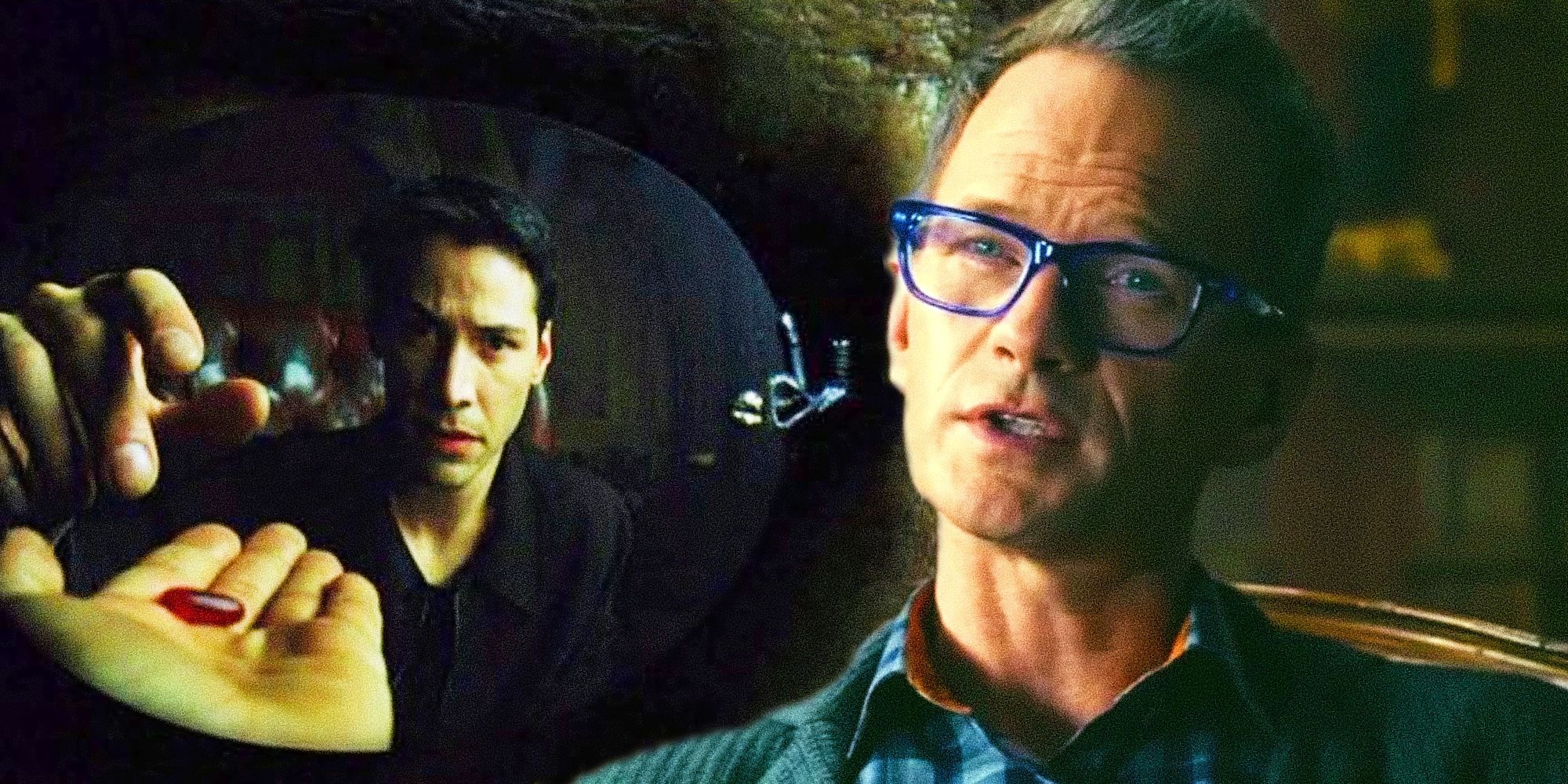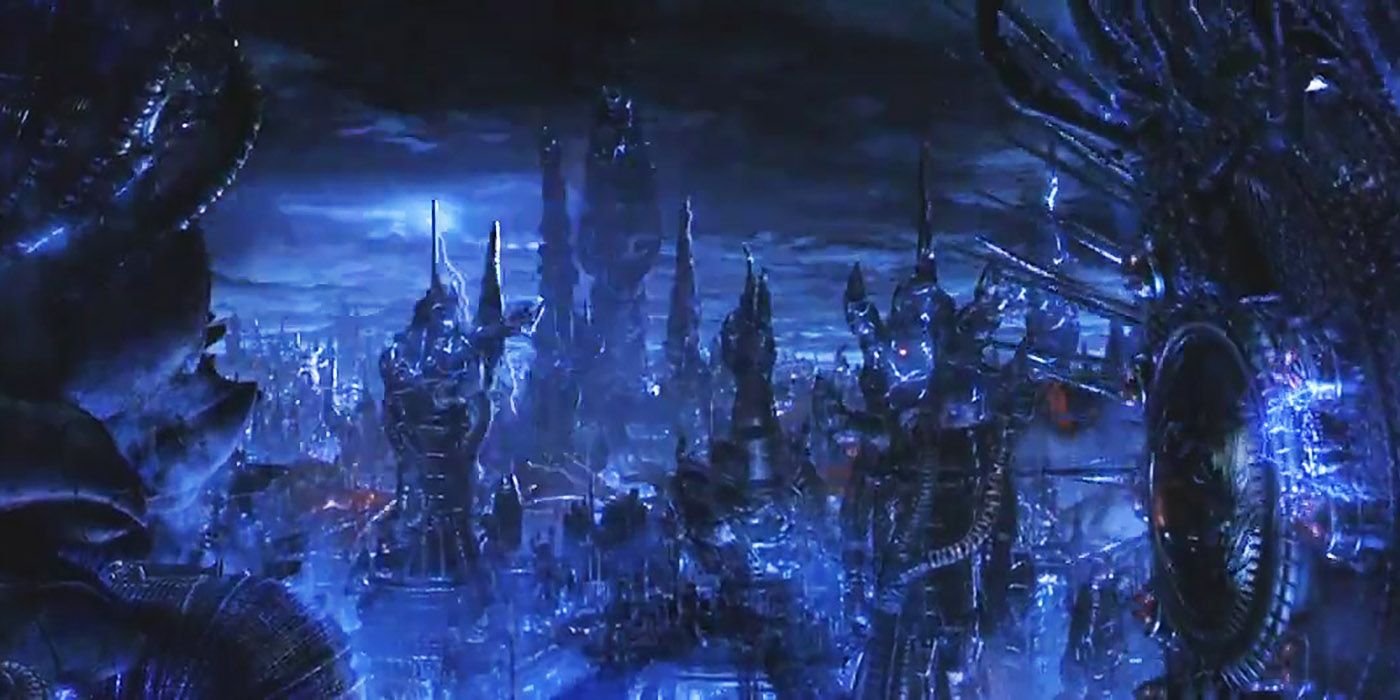One compelling new Matrix 4 fan theory posits that The Analyst is actually The Archivist, radically changing the complexion of The Matrix Resurrections. First released domestically on December 22nd, 2021, The Matrix Resurrections transports audiences back to a much-changed simulation inhabited by several new artificial constructs from the machines' world. One such program is The Analyst (Neil Patrick Harris), the creator of the current iteration of the Matrix and the chief architect of Neo (Keanu Reeves) and Trinity's (Carrie-Anne Moss) survival following the events of The Matrix Revolutions.
Midway through The Matrix Resurrections' runtime, Neo approaches Trinity at the garage where she works, hoping to wake her from the Matrix's new simulation. However, before Neo can get close to Trinity, he is stopped by the Analyst, who delivers a lengthy monologue via bullet-time on how he came to be the singular director of his version of the Matrix. The Analyst goes on to break down Neo's contribution to the new Matrix as a game designer, The Analyst no longer using Agents to enforce the Matrix's programs, and how Neo and Trinity came to be saved by the machines.
Yet one striking The Matrix Resurrections theory (via Reddit user mybustersword) suggests The Analyst's actions, in fact, unmask him as the Matrix's chief Archivist. From The Analyst's use of bullet-time and obsolete modal development plans to referencing Neo and Trinity's energy pods as "mausoleums," the evidence for Neil Patrick Harris' character being a concealed Archivist is compelling. As a result, here's The Analyst is actually The Archivist theory explained, as well as what Archivists are in the world of The Matrix.
What Is An Archivist In The Matrix?
Put simply; Archivists are a group of renegade exile programs that are the masters of the mysterious Archive. The Archive consists of pockets of history strewn across the Matrix that depict remnants of various points in time within The Matrix canon. Access to this overarching Archive is restricted to the few programs that have acquired a key, with the Archive containing a myriad of constructs that can replicate a past version of the Matrix, in essence acting as a time capsule for historical iterations of Matrix worlds.
To maintain these sprawling Archives cohesively, the Archivists defected from the Machines and sold out the services of the Archive to the highest bidder, maintaining a strictly neutral position following the truce between Neo and Deus Ex Machina at the end of The Matrix Revolutions. However, when it comes to protecting the Archive and its secrets, the Archivists enact a paranoid and fierce agenda, often veiling their constructions under false pretenses.
Why Neil Patrick Harris' Analyst Is Really The Archivist
Neil Patrick Harris' Analyst, therefore, skews much closer to an Archivist in terms of his motivations, actions, and need to control the Matrix. While The Analyst goes to purportedly great expense to revive Neo and Trinity for their power source, this Archivist theory instead posits that Neo is living out a type of exhibit for machines to see what the Matrix and The One anomaly was during the iteration of the Matrix in which Neo and the original Matrix trilogy took place.
There are several prominent markers that help this theory gain traction, starting with the Analyst's statement that he does not use Agents anymore during the garage scene. This statement directly contradicts Neo's purpose before he is reawakened at the beginning of The Matrix Resurrections, with Neo working on a modal to train Agent AI - an obsolete practice coded into his existence in this Matrix iteration. This makes even less sense when Neo's modal is revealed to contain a close recreation of the original Matrix movie's events, making it feel much more akin to an exhibit of the 1999 Matrix as opposed to events happening in real-time.
Despite The Analyst supposedly needing humans to power his Matrix outside of Neo and Trinity, he appears incredibly flippant when sacrificing his human power sources at will. The entirety of the Matrix in The Matrix Resurrections appears to be made of shell programs which activate in a swarm mode and continually attempt to convince Thomas Anderson that he is not Neo at the start of the movie, before ultimately attacking Neo and Trinity en-masse as they try to escape in Resurrections' final battle scene. In this way, The Analyst sacrifices thousands of real humans with no apparent consequences, which makes much more sense if the bots he is tasking to swarm are not real humans.
Furthermore, The Analyst, as well as Bugs (Jessica Henwick) and several other characters, refer to the pods Neo and Trinity are stored in "mausoleums" and "a mausoleum" across The Matrix Resurrections story, which without context is an odd way to reference a power source pod. Yet this again ties into the idea that the Matrix shown in Resurrections is an Archive exhibit being looped for the Machines, with a chief Archivist presiding over its modal events.
Yet perhaps the biggest clue to why The Analyst is an Archivist in disguise is his use of the iconic bullet-time in The Matrix Resurrections. Whereas Neo was able to control bullets and slow time as The One, Archivists do not possess similar powers, meaning the only way The Analyst can achieve these feats is if the entire Matrix in Resurrections is a looped recording. As audiences have already pointed out, the real Neo should be able to break The Analyst's bullet-time gimmicks with his powers, but as Neo is bound by the limitations of the program itself, he is unable to. This infers, therefore, that the events depicted in The Matrix Resurrections are not happening in real-time, which is (according to the theory) why Neo can have a digital self-image different than his own residual self-image - further indicating he is not real. As a result, this evidence makes a strong case that The Analyst is actually an Archivist portraying the results of the machine war after peace was initially brokered between Neo and Deus Ex Machina, adding a far darker spin on the events of the Matrix 4.



